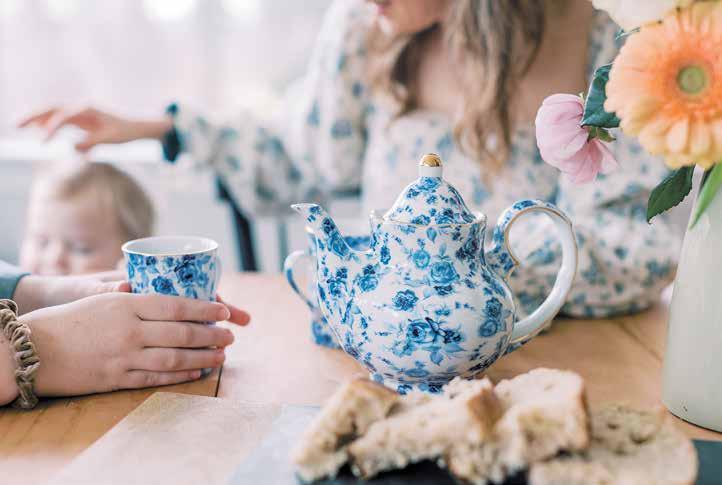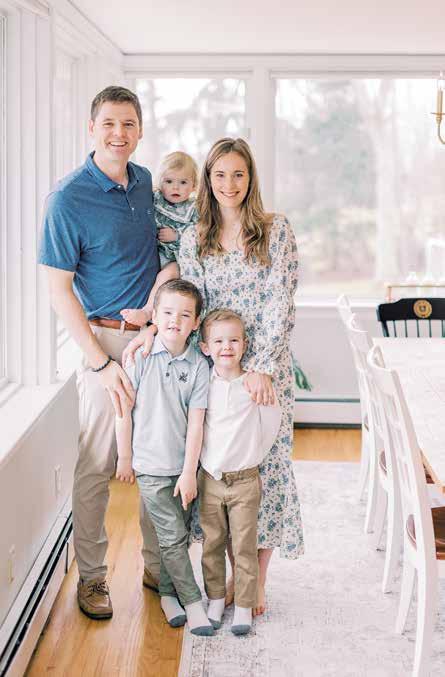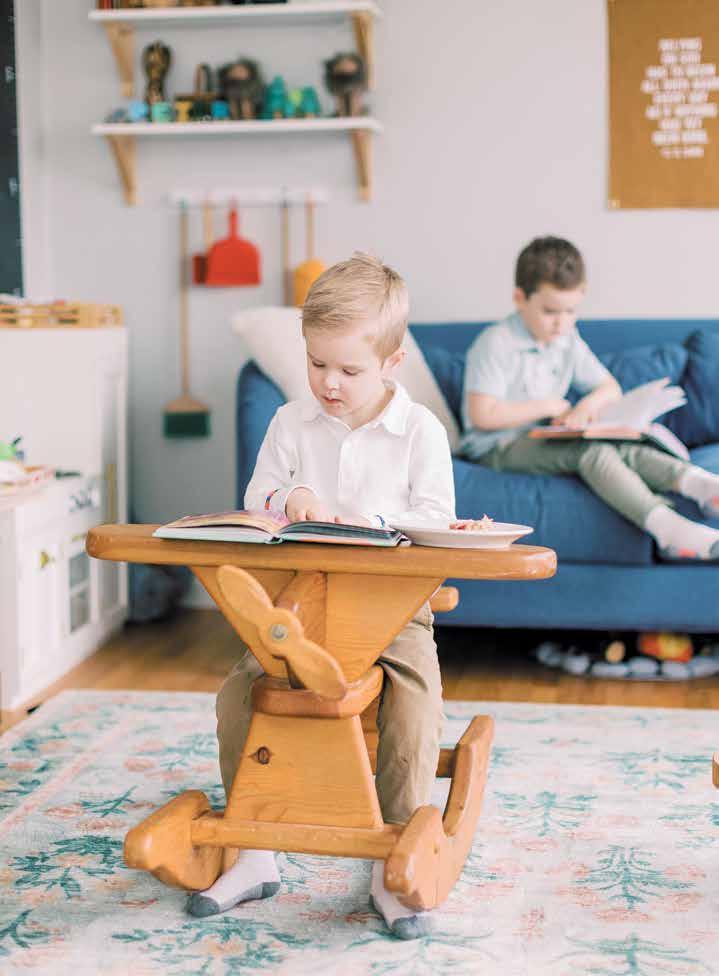
14 minute read
The Theology of Hospitality
from Embodied Spring 2023
by embodiedmag
By Kathleen Basi
Emily Hannon never thought of herself as a perfectionist. In fact, she always considered herself pretty laid back... until she was a stay-at-home mother of three.
Advertisement
“I’m an introvert,” said Emily, 30, a photographer from Pittsburgh. “The constant noise and activity start to grate on me.”
She loves all things beautiful, all things serene, and she wants her home to be calm and beautiful.
It’s a tricky balance with three kids 5 and under. She wants them to play and imagine—the 4-year-old taking out every couch cushion and blanket to make a fort or the 5-year-old playing soccer in the living room with the World Cup in the background are great things. “But I still like to go to bed with a clean house—at least the kitchen and the main living space. It makes my heart go faster when there’s a mess all over the floor and I can’t walk through it.”

Photo by Caitlin Renn
For many of us, hospitality means welcoming others into our homes. This is a Christian virtue and charism. It’s also a charge of the theology of the body: What is hospitality if not making a gift of self and welcoming the other?
Yet hospitality is hard. We’re stretched thin and living in a world where it’s all too easy to define ourselves by how we compare to others in our social circles or on social media. How, then, do we live out this calling?
People, not trappings
Emily’s family recently attended a surprise birthday party for a friend.
“I would have cleaned my house if I knew all these people were coming!” her friend remarked.
But Emily saw only a house where every square inch was filled with love. “I almost felt embarrassed that she would think I was judging her,” she said. “As a guest, I was just struck by the people, the warmth, the children, the light.”
When we consider hospitality through the lens of the theology of the body, there are two simultaneous truths at work. On the one hand, our homes are, to some extent, reflections of ourselves. So when we let people into our homes, we are inviting them into a part of ourselves. It can be scary to let people see our messes.
“It’s been striking me lately that hospitality requires so much humility and vulnerability,” Emily said.
At the same time, the theology of the body calls us to make a gift of ourselves to others. In terms of hospitality, that means being present to another person and not being preoccupied with the surroundings.
Emily pointed to a night when her family hosted an engaged couple for dinner. “Usually our home is so insular. At this time of day, we’re racing to get the kids to bed. It’s a mess. And then suddenly you let strangers into that? It feels like the gig is up! They’re seeing our real life!”
Yet she savors the memory of that night. “It was really fun to hang out together and for them to see normal family life.” The condition of the house didn’t matter as much as the gift of their presence.
It’s easy, in these days of showcase homes on social media and HGTV, to feel discontented. Emily loves interior decorating. She enjoys finding the items that express who she and her family are. She, too, shares beautiful photos of her home on Instagram. But the messes still exist. They’re just behind the lens. Also, beautiful, self-expressive homes do not happen in a single sweep of the home improvement store.
Much of her home decor was bought off Facebook Marketplace, and many of the items took six months to a year to find. “It’s OK for your house to be unfinished for years,” she stressed.
When we see those Instagram influencers, with the before-and-after, we sometimes forget that this transformation cost a ton of money and time—and was probably paid for by someone else.
Besides, when you’re invited to someone’s house, are you excited about the house or the people? Being warmly greeted, listened to and made to feel seen is what we all long for—a chance to experience communion. Living hospitality, according to TOB, means existing in the moment, accepting good enough and receiving our loved ones and our surroundings, warts and all.
And isn’t it a relief to walk into someone else’s home and see that it isn’t perfect? That they, too, have to exist amid cluttered counters, marker-scribbled wall sockets and dinged-up hand-me-down furniture? Hospitality lets us give this same gift to others.
“Even if you think other people have it all together, have the perfect houses, they don’t,” Emily said. “All of us have unique gifts. Sure, maybe someone is objectively more organized than you are, but that doesn’t mean every aspect of their life is better. I can keep a clean home, but I still struggle every night to make dinner!”
The flip side of the coin
In other words, hospitality is not about the space, but about the gift of self, the communion of persons.
It can be easier if you’re hosting people in the same stage of life. If both you and your guest have young kids, it takes some of the pressure off. You certainly don’t want them to feel they can’t come over for fear of messing up your house!
But taking time to prepare for guests and clean your house is a gift of self, too. When Emily recently visited her sister, she felt this gift. “I had my own bedroom. My brother-in-law brought a space heater and laid the towels out nicely. I knew they put some thought into me coming here.”

Photo by Caitlin Renn
Preparing for guests is a way of acknowledging and honoring their innate human dignity. When we prepare for guests by cleaning, even mundane tasks like sweeping the floor or preparing a meal become a way to serve others. And offering to watch someone’s kids? A huge act of service and hospitality. This is the TOB principle of self-gift in vibrant color.
Scary circumstances
For some people, questions of hospitality are much more difficult. Jeremy and Maria Henson, of Hallsville, Mo., were less than a year into parenthood when their baby was diagnosed with life-threatening food allergies.
The Hensons grew up in strong Catholic families in which food and fellowship were inseparable from hospitality and faith. Finding out their first child could die if exposed to certain foods was crushing.
“Some people with allergies can be in a place and mingle and maybe even eat a little and be OK,” said Maria, 39, a homeschooling mom of three. “There’s the medium level where a person can’t eat it, but they can be around it safely. And then there’s that high level.”
For Cari, the Hensons’ daughter, milk, peanuts, tree nuts and eggs evoke an almost instant combination of rash and wheezing. When they received the diagnosis, they didn’t know what to do. Where could they go safely when babies crawl around on the floor and put things in their mouths? Even church was risky. “We thought we wouldn’t be able to do family or community gatherings for years,” Maria said. “It really hit home how much food is involved in every aspect of our lives.”
At first, they thought they could simply do all hosting themselves. “But that was difficult too,” said Jeremy, a 39-year-old financial aid officer. “Friends with young children would bring snacks that Cari was allergic to.” And even adults carry allergens into the house on their hands, faces and clothes. Until Cari was old enough to manage her own food allergies, their ability to be in community was severely limited.
For families in this situation, the hardest things are the isolation and the inability of others to accept and accommodate. For Jeremy’s mother, eating out was a major part of community. Maria and Jeremy tried to preserve the tradition. “We’d be very explicit,” Jeremy said.
“Restaurants have an allergen menu, but we’d say, ‘You must clean the grill.’ And the problem was, the allergens were all over the restaurant.”
After one manager, fearing liability, refused to serve them anything but plain chicken breast, the Hensons decided it was better just to eat at home.
Family members, friends and community members of people facing such profound barriers to hospitality have a unique opportunity to put the theology of the body into practice. We have such strong expectations surrounding what hospitality looks like. What do you do when the dignity of the other requires you to set aside those expectations or to adopt a whole new paradigm?
Early on, the Hensons prepared for a visit by laying out their rules. “Nobody in the house can eat anything she’s allergic to while we’re there,” they said. Everyone said they understood, and yet the next thing Maria knew, someone had eaten an egg for breakfast before they left. In a hurry, not thinking, that person gave Cari a kiss on the cheek on the way out the door.

Photo by Caitlin Renn
“I couldn’t do anything,” Maria said. “It was like I was watching it happen in slow motion.”
The door closed. By the time Maria got the EpiPen, Cari was already wheezing. “The rule is, you give the EpiPen and call the ambulance,” she said, “but we were in a rural area. We just got in the car and headed straight for the hospital.”
Opening our hearts
The Hensons realize it can be hard for others to be challenged to change their rituals or be inconvenienced. They have encountered resentment from some who believe the burden belongs solely to the person with the medical condition. In responding to this, Maria says that to reflect Christ she has learned to die to self to avoid harboring resentment in return.
And it helps her stay grateful for those people who do care enough to find the ways to accommodate her family’s needs.
Because despite the difficulties, Maria knows that “hospitality is about communion. It’s as necessary as breathing, as air. There sometimes need to be accommodations in order for that communion to take place,” she said. Hospitality is a call to see each person in all their human dignity and make the effort to ensure that no one is isolated from community.
Eventually, the Hensons developed a set of rules that allowed them to have limited visitors. People have to avoid eating right before coming; they have to take off their shoes and wash hands upon entering.
“The allergens change what we can offer,” said Jeremy, “but no matter what we’re offering, you’re coming together and giving the opportunity to image God to each other.”
It’s still hard, especially when otherwise good people show unwillingness to accommodate. But Maria offers grace. “People are in different stages in their lives,” she said. “Until it clicks for them, it’s just where they are. We’re called to be patient and wait for people to understand.”
A doorway to discipleship
For Len and Gail Froyen, of Cedar Falls, Iowa, the practice of their faith over the past four decades has revolved around hospitality toward college students.
Len, 88, is a retired deacon for the archdiocese of Dubuque who served at St. Stephen the Witness Catholic Student Center, across the street from the University of Northern Iowa. When the Froyens moved to Cedar Falls, they chose to attend the student center instead of a local parish.
“The energy of the students was really important,” said Gail, 85, a mother of three, grandmother of four and great-grandmother to four. “When we went to the Wednesday night student Mass, the kiss of peace took 10 minutes, because everybody went around the whole church. We got to know a lot of kids that way.”
St. Stephen doesn’t offer programs for schoolchildren or adults. Their mission is college students. “The priest directors were insistent that if you were going to come to St. Stephen as a non-student, your responsibility was to work with the students,” said Gail. “To get to know them, to make them feel welcome in any way you could. You just didn’t go there because it was a convenient time and place to go to Mass.”

Photo by Caitlin Renn
As deacon, Len was assigned to St. Stephen and then to work with archdiocesan formation of new deacons. He operated out of the student center and participated in its ministry. Over the years, the Froyens volunteered as sponsors for marriage prep, for marriage and student retreats, and more. Gail, a storyteller, trained and practiced with the lectors.
St. Stephen’s motto is “Pray, serve, belong.” But “belonging”—hospitality—is where it starts. Gail remembers adult staff keeping watch for students who were alone, who looked lost or insecure. Staff would grab a student they already knew and say,
“Go stand by that person! They don’t know what to do!”
“This helped kids understand how to be hospitable to each other,” Gail said.
This is important because when students feel welcomed, comfortable and valued in the student center— when their inherent human dignity is honored—they are more open to participating in spiritual and service programs.
Len says this feeling of belonging begins with the most elemental selfgift: listening. “That sounds simple, but it isn’t,” he said. “At daily Mass, students express their intercessions. You learn a lot about what students are concerned about, what bothers them.”
As deacon, he offered the first spontaneous prayer and then listened to their petitions. This often led to conversations after Mass.
Len draws on his wife’s experience as a storyteller. When students come to school, he says, they have a story of who they are and how they fit into the world. At the university, they have to write a new story. St. Stephen’s job is to help them weave their faith into that story, so they can go into the world and give that story away: to become self-gift to the larger world—through marriage, yes, but also through career and life choices.
So if hospitality facilitates a student exploring his or her faith, then it is a gateway to holiness—a holiness expressed through self-emptying, self-gift and service to the presence of Christ in the other. “You can’t really separate holiness and service,” said Gail. “Jesus asked us to take care of the sick, feed the hungry. At St. Stephen, opportunities are provided for service. Now, lots of our students come from small towns, and they have no doubt grown up with the idea of taking care of their neighbors. But to learn to take care of people at the larger state, national and world levels is different. That kind of service comes out of faith and prayer.”
The hands and feet of Christ
Hebrews 13:2 reminds us, “Do not neglect hospitality, for through it some have unknowingly entertained angels.” Perhaps it’s more to the point to remember that when we open ourselves and our homes in a holy exchange of persons, we are entertaining Jesus himself.
* * *
Hurdles to hospitality
How can you reflect Christlike hospitality when facing obstacles to typical expressions of hospitality? Here are some tips.
1. Search your heart and pray for openness. Sometimes, our own biases create barriers to discipleship.
2. Be willing to step outside your comfort zone, whether that means masking during a pandemic or accommodating severe food restrictions. Remember that it’s not about our convenience and comfort but about being self-gift.
3. Food restrictions are not the only barriers to hospitality. Maria Henson pointed to people who truly cannot handle crowds—for example, some on the autism spectrum. Those people need communion too. Carve out time for a one-on-one visit.
4. When someone tells you their restrictions, adopt a can-do attitude. Don’t make them feel their restrictions are a burden on you. Ask, “how can we make this work?” Maria’s mother took over food prep for every family gathering so the Hensons could attend without worry for their children’s safety. Another friend deep cleaned her house so that they could host the Hensons. “It still touches my heart to think about it,” Maria said. “That was a big gift.”

